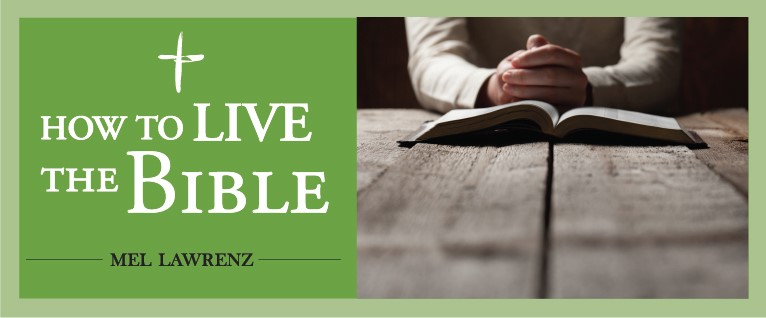
This is the ninety-seventh lesson in author and pastor Mel Lawrenz’ How to Live the Bible series. If you know someone or a group who would like to follow along on this journey through Scripture, they can get more info and sign up to receive these essays via email here.
Mel Lawrenz will be offering daily online ministry during this health crisis. Sign up here.
Once in a great while our lives change dramatically all at once and on short notice.
That is where we live now. For many of us it was just days ago we suddenly realized that extraordinary changes would take place in order to slow down the spread of an invisible little virus called COVID-19. Who would have guessed businesses and schools and sporting events would be shut down? Even churches have to learn new ways for ministry to carry on.
A lot of Christian leaders are sending the word “fear not.” That is appropriate (the Bible says it many times), but there is so much more to say. We need to know the reasons for faith and peace.

My father died of the flu when he was just 27 years old. I was 4. But I realized decades ago, when I turned 27, and then 28, that I could not live in fear. But it was not just because someone said, “Fear not.”
We know from Scripture that God is over all creation, even the broken, conflicted, diseased world in which we live. God is not indifferent to suffering. The Bible teaches that there will come a day when God will remake all things and that then “there will be no more death or mourning or crying or pain, for the old order of things [will have] passed away” (Rev. 21:4). In the meantime we do continue to occupy a world where auto collisions happen and earthquakes break the ground beneath us and diseases linger and take a toll.
When I feel shaken, or people I know feel frightened, I so often think about a simple statement by the Apostle Paul about what does not change, when everything around us seems unpredictable and shaky. It is this: “Now these three remain: faith, hope and love. But the greatest of these is love” (1 Cor. 13:13).
Faith. Hope. Love. These are not merely sentiments. Not mottos. Not cliches. These are the contours of living with stability even in the most turbulent times. Faith, hope, and love also guide us in practical decisions we make every day.
FAITH
This is when we say “We believe in God, the Father Almighty. Maker of heaven and earth. And in Jesus Christ, his only Son, our Lord” and so on. Faith allows us to know not just that God exists, but the type of God he is. “Father” tells us God is not an impersonal force. We can talk to God. God cares. Jesus said: “Are not two sparrows sold for a penny? Yet not one of them will fall to the ground outside your Father’s care. And even the very hairs of your head are all numbered. So don’t be afraid; you are worth more than many sparrows.”
HOPE
Without hope, we are not alive. Hope is knowing something is real even if you don’t see it right now. Hope tells us we won’t always have to practice “social distancing.” We will get back to normal. We will survive. And ultimately, our hope is an upward vision of life with Christ now, the Spirit moving powerfully among us and in us, and with God more fully after this life on earth, when the final peace will come. Hope is not wishful thinking. It is a realistic view of life that says that a good God will, of course, move us beyond whatever our pain may be today.
LOVE
Paul says this is the greatest of the three. Of course, that’s true. Nothing is more important than knowing there’s someone who cares for us. Maybe we can think right now of friends and family who care about us, maybe a lot, or maybe just a little. But the big truth is that God loves us. It’s really true. Why else is it that the most beloved verse in the Bible is “For God so loved the world that he gave his one and only Son, that whoever believes in him shall not perish but have eternal life” (John 3:16)?
Everything is changing right now. But faith does not change, nor hope, and not love.
The question is, how can we firm up those realities? And is this the time for us, more than ever before, to show others how they, too, can base their lives on faith, hope, and love?
__________________
Get Mel Lawrenz’s daily thoughts and prayers during this health crisis by signing up here.
___________
[If you believe this series will be helpful, this is the perfect time to forward this to a friend, a group, or a congregation, and tell them they too may sign up for the weekly emails here]
Mel Lawrenz (@MelLawrenz) trains an international network of Christian leaders, ministry pioneers, and thought-leaders. He served as senior pastor of Elmbrook Church in Brookfield, Wisconsin, for ten years and now serves as Elmbrook’s teaching pastor. He has a PhD in the history of Christian thought and is on the adjunct faculty of Trinity International University. Mel is the author of 18 books, including How to Understand the Bible—A Simple Guide and Spiritual Influence: the Hidden Power Behind Leadership (Zondervan, 2012). See more of Mel’s writing at WordWay.
The post How to Live the Bible — Standing Firm During This Health Crisis appeared first on Bible Gateway Blog.









